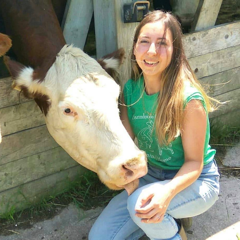
Edith Barabash
Law students wear many hats, and at Osgoode, many students also wear the hat of being community organizers. I had the honour of interviewing 12 JD students about their involvement in various social justice movements and community initiatives this past year. Here is an overview of their work.
Edith Barabash (2L) is Co-Founder and Executive Director of Farmhouse Garden Animal Home (FGAH), an animal sanctuary for farmed animals. She is also Co-President of Osgoode Hall Animal Justice (OHAJ). Edith is a dedicated animal rights and environmental activist, and she hopes to practice environmental law.
Edith was drawn to animal rights and environmental work through her involvement in farming internships during her undergraduate degree in Environmental Studies. She researched and wrote about food sovereignty, and advocated for people to have access to organic, healthy food. This led her to learn about problems in our food system related to animal agriculture.
For Edith, the animal rights movement necessarily intersects with environmental movements: “by focusing on animal rights and connecting people with animals, we foster a respect for the environment and for other beings on this planet. Animal agriculture is one of the leading causes of climate change.” She calls our attention to resources like the UN report, “Tackling Climate Change Through Livestock,” which details how animal agriculture is a leading contributor to greenhouse gas emissions, deforestation, water pollution, and more.
Moreover, Edith emphasized the importance of all social movements to work together in dismantling related systems of hierarchy and oppression: “through OHAJ, we are planning a panel that brings together feminist scholars to discuss the connections between animal agriculture, eating meat, and feminism. It all comes back to dismantling hierarchical thinking and acknowledging that oppression of animals gives way to the oppression of humans – it’s often people of color, immigrants, and lower-class communities that suffer most from the harms caused by animal agriculture industries.”
Having legal knowledge, Edith said, helps with activism, especially when advocating for legislative reform. She spoke about the need to prevent the passage of Bill 156, an ‘ag-gag’ bill that would make it illegal to expose animal cruelty on farms and transport trucks.
When asked about her role as an activist, Edith said, “it’s very important for me to connect people with animals, to help people realize that animals are sentient individuals. Through my work at the animal rescue, it’s important for me to create a place for people to learn about and have face-to-face interactions with animals, to realize how unique and amazing they are. When we reduce animals to nothing but food on our plates, it makes it difficult for us to then be able to fight for them to have strong legal protections.”
Edith’s call to action invites us all to do our part. “You don’t have to throw yourself fully into this kind or activism or even label yourself as an activist in order to care about animals and the environment,” she advised. “It’s about making conscious decisions to be more socially responsible individuals and to educate ourselves about these problems.”
